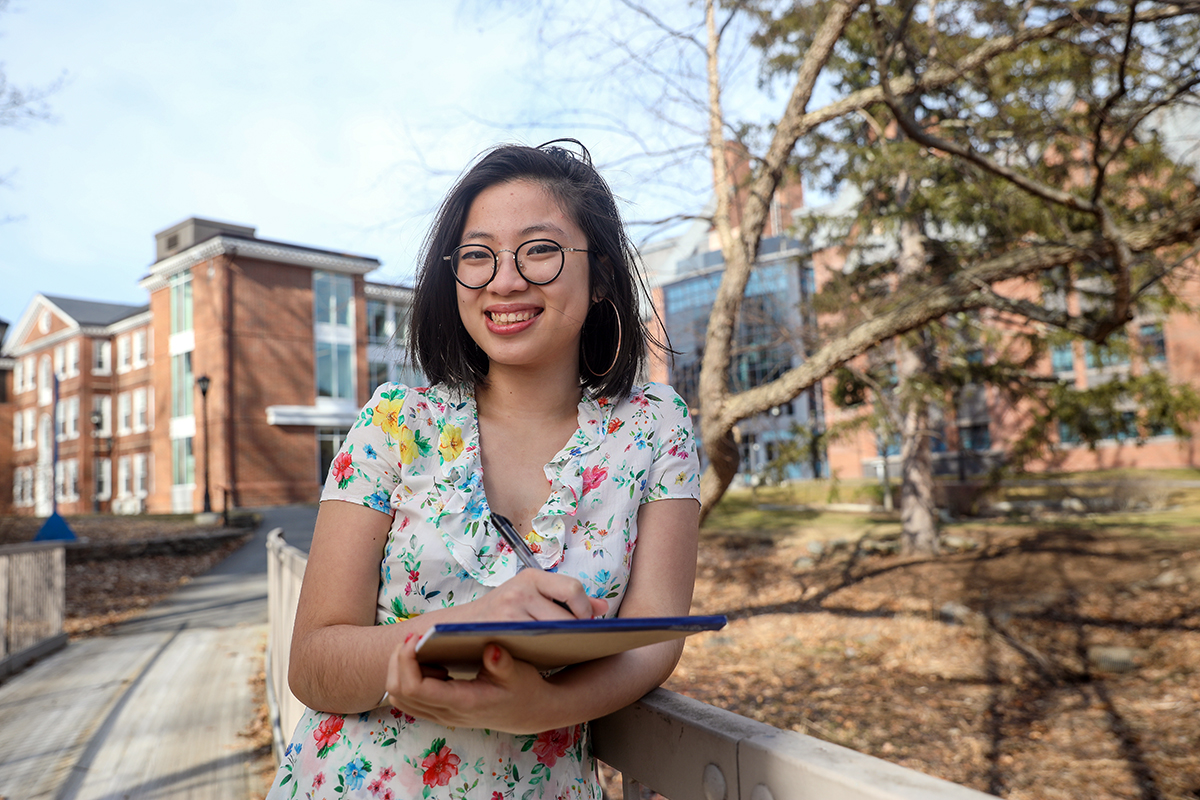I see fact-based climate journalism as a form of activism.”
Mai Hoang

When Mai Hoang was 13, there was a devastating toxic chemical spill in her native Vietnam. It spanned four provinces and killed 70 tons of fish that washed up along 125 miles of coastline.
Distraught, Hoang wanted to do something. When she heard whispers that a group of her English Center classmates and teachers were going to protest the government’s inaction, the nascent climate activist pushed past her fears and joined the group carrying banners that asked questions and demanded a response.
The event changed her life. “I remember walking past a row of police and being really scared,” she says. “But it showed me that I have a voice.”
Budding activist
Protesting the environmental damage caused by the Formosa Ha Tinh Steel Corporation was the start. Journalism would come a year later, after she arrived at Exeter. “I had to find a way to exert my voice beyond the street,” Hoang recalls. “I see fact-based climate journalism as a form of activism.”
Hoang began to pitch stories to Vietnam’s leading newspapers — all government-run — from her dorm room in Amen Hall as a lower. One of her first published articles was about a planned expansion of a $5 billion thermal power plant in the southern province of Long An. Hoang’s piece shed light on the ways the plant’s growth would increase emissions and have devastating effects on the residents of the region as well as the environment. “I had to keep my sources anonymous,” she explains. “I know that this is dangerous journalism, but the alternative — to stay quiet — is not an option.”
In 2018, after Hoang’s article was published, the plant altered its plans and switched from coal to gas. It was a small victory for a teen worried about the existential threat of climate crisis in Vietnam and the world. “I will never know for sure if my piece had anything to do with the decision, but I feel very proud that I contributed to the conversation,” she says.
Hoang has continued to hone her writing and researching skills at the Academy as the former managing editor of The Exonian, secretary general for the Model UN Club, and a member of the Climate Action Day Committee.
Hoang also writes poetry on the side. She won the Lamont Younger Poet Prize in 2018 and received a silver medal with distinction for her writing portfolio in the 2020 National Scholastic Art and Writing Awards.
Keeping them honest
Beyond campus, Hoang has become a powerful voice on the global stage. During her upper year, she traveled to Poland with the climate journalism nonprofit Climate Tracker to cover COP24 — the 24th Conference of the Parties to the United Nations Framework Convention on Climate Change — for Vietnamese newspapers.
As a part-time Climate Tracker employee, Hoang records the climate action of Paris Agreement participant nations and holds governments around the world accountable. In her role as a youth coordinator she has also created digital guidebooks for high schoolers interested in covering the climate. In August, she will be organizing Climate Tracker’s second climate reporting training for professional journalists in Vietnam.
Hoang is a recipient of the 2020 Perrin Fellowship and will take a gap year upon graduation to work at Cát Tiên National Park in southern Vietnam, as well as volunteer in other climate-vulnerable countries including Bangladesh, Madagascar and Senegal.
Meanwhile, she keeps pitching stories to newspapers in her native land, where her editors have no idea that she is so young. “I don’t advertise that I am still in high school,” she chuckles.
— Sandra Guzmán


